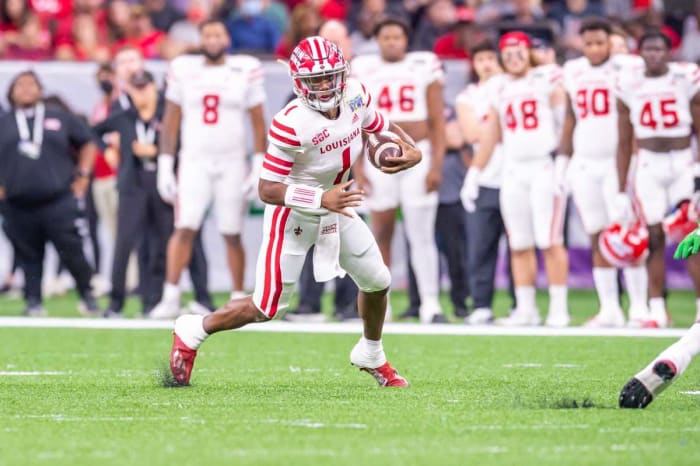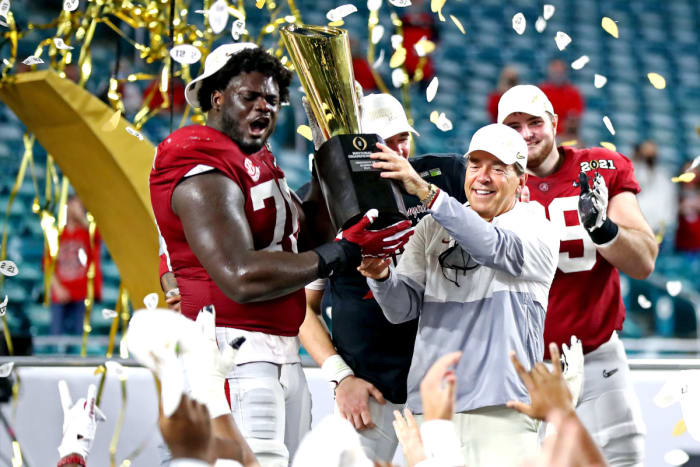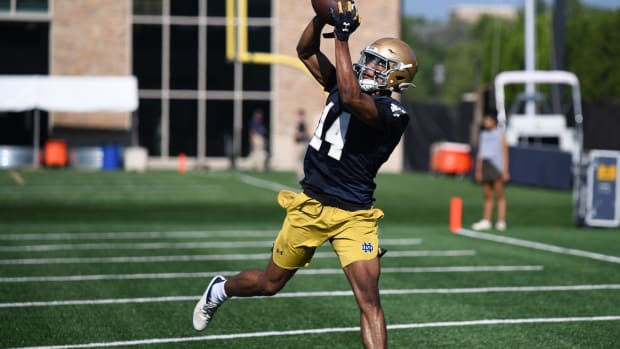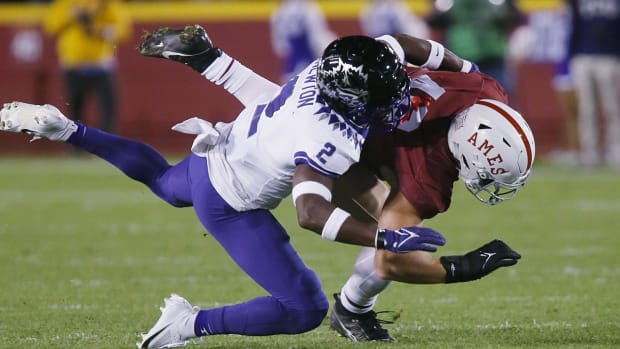College Football Playoff Expansion: Would It Really Make A Difference?
I want to get two things out of the way early here. Number one, my favorite team growing up, Ohio State, would benefit from an expanded playoff in 2021. Second, an expanded playoff would not make a difference in the championship in any year.
Let's move on.
There's three groups of people when it comes to Playoff expansion:
- Those who believe the expansion would correlate to more meaningful games and less opt-outs.
- Those who believe expansion would lead to more lopsided matchups and a condensed group of winners in an already top-heavy sport.
- Those who see expansion as a money hungry power grab by media giants.
In a way, everyone is right.
Expansion Means More Meaningful Games and Less Opt Outs

Heisman finalist Kenny Pickett opted out of Pitt's Peach Bowl game against Michigan State. The Panthers would lose the game 31-21.
Moreso in 2021 than any other bowl season, we saw players announcing their intent to opt out of non-playoff games. Therefore, by adding more playoff games, fewer players would opt out of these suddenly-relevant games.
While this is true, it's also circumstantial. Compare the meaningfulness of the Rose Bowl to Utah versus to Ohio State; compare the meaningfulness of the Sugar Bowl to Ole Miss versus to Alabama. Depending on the team's relative success level, these New Year's Six games have different levels of meaningfulness.
Conversely, there's an argument that folding the Rose Bowl and the Sugar Bowl into the playoff mix annually, it strips their meaning away. Instead of being the Granddaddy of Them All, the Rose Bowl becomes the college football equivalent of the NFL's Divisional Round. Okay.
Expansion Would Lead to More Lopsided Matchups and a Condensed Group of Winners in an Already Top-Heavy Sport
Folding all of the New Year's Six Bowls and the next crop of highly-ranked bowl games into the playoffs strips the victories of those teams. All of a sudden, Michigan State's Peach Bowl victory doesn't stand because they lost the next round against Alabama. Baylor's Sugar Bowl victory was fun, but they were crushed by Georgia in the next round.
Understandably, it means less winners.
However, let's leave the "more lopsided" argument behind as a New Year's Resolution. The average point margin in the College Football Playoff semifinals is 21.1 points in favor of the victor. The average point margin in the College Football National Championship is 15.3. Progress, I guess.
Results are dictated on individual matchups and schemes. Could Ohio State or Notre Dame have closed the gap better than Cincinnati? Probably not– these teams have been boat-raced by Alabama in the recent seasons.
Expansion is a Money Hungry Power Grab by Media Giants
Well, yeah. College Football is a multi-billion dollar industry. Get over it.
What Would A 12-Team Expanded Playoff Look Like In 2021?
There's multiple ways to do this: First, take the top 12 ranked teams. Second, take the nine conference winners and the next three highest-ranked "at larges." Within the second option, you can seed the team based on 1-9 being the conference winners and going from there, or ranking them in their order of finish. We'll look at both options, but the latter implication of the second route.
We're also going to remove opt outs, but existing injuries stay in place.
Taking the Top 12 in the Final College Football Playoff Rankings
The seeds:
- Alabama Crimson Tide (12-1) -- BYE
- Michigan Wolverines (12-1) -- BYE
- Georgia Bulldogs (12-1) -- BYE
- Cincinnati Bearcats (13-0) -- BYE
- Notre Dame Fighting Irish (11-1)
- Ohio State Buckeyes (10-2)
- Baylor Bears (11-2)
- Ole Miss Rebels (10-2)
- Oklahoma State Cowboys (11-2)
- Michigan State Spartans (10-2)
- Utah Utes (10-3)
- Pittsburgh Panthers (11-2)
The matchups:
- (5) Notre Dame vs. (12) Pitt
- (6) Ohio State vs. (11) Utah
- (7) Baylor vs. (10) Michigan State
- (8) Ole Miss vs. (9) Oklahoma State
Where is the best possibility of one of the top four teams (Alabama, Michigan, Georgia, Cincinnati) getting upset in that second round?
- (1) Alabama vs. 8/9 Ole Miss/Oklahoma State
- (2) Michigan vs. 7/10 Baylor/Michigan State
- (3) Georgia vs. 6/11 Ohio State/Utah
- (4) Cincinnati vs. 5/12 Notre Dame/Pitt
In case you're considering these matchups and realizing a lot of the matchups look familiar, it's because they are. We saw Alabama beat Ole Miss by 21 and Cincinnati beat Notre Dame fairly handily. So those teams aren't it. We did see Michigan State upend Michigan, but that game was at home for the Spartans and marred by officiating. So, as a gambling man, I wouldn't put my money there.
We also already saw Ohio State-Utah. That whittles down a few interesting possibilities:
- Michigan vs. Baylor
- Georgia vs. Ohio State
- Cincinnati vs. Pitt
Baylor matches up fairly well with the Wolverines, so we'll let that through as a wild card. We saw what happened to Michigan, who blew out Ohio State, at the hands of Georgia. You'll have to bear with some hand-waiving, we have another scenario to sift through. But our new semifinal would look like this:
- (1) Alabama vs. 4/5/12 Cincinnati/Notre Dame/Pitt
- (3) Georgia vs. 2/7 Michigan/Baylor
Already, you can see where this is going: an Alabama-Georgia National Championship. On the way, we essentially vacated:
- Ohio State's Rose Bowl win
- Baylor's Sugar Bowl win
- Oklahoma State's Fiesta Bowl win
- Michigan State's Peach Bowl win
Or, in other words: four of the six New Year's Six winners.
Taking the Conference Winners + 3 At-Larges

Louisiana standout quarterback Levi Lewis runs the ball in the R+L Carriers New Orleans Bowl against Marshall.
The seeds:
- Alabama Crimson Tide (12-1) -- BYE
- Michigan Wolverines (12-1) -- BYE
- Georgia Bulldogs (12-1) -- BYE
- Cincinnati Bearcats (13-0) -- BYE
- Notre Dame Fighting Irish (11-1)
- Ohio State Buckeyes (10-2)
- Baylor Bears (11-2)
- Ole Miss Rebels (10-2)
- Louisiana Ragin' Cajuns (12-1)
- UTSA Roadrunners (12-1)
- Utah State Aggies (10-3)
- Northern Illinois Huskies (9-4)
The matchups:
- (5) Notre Dame vs. (12) Northern Illinois
- (6) Ohio State vs. (11) Utah State
- (7) Baylor vs. (10) UTSA
- (8) Ole Miss vs. (9) Louisiana
Do we need to run through these again? Or do we see where it'll go?
For those who will really put up a fight about having a Group of Five upset, Louisiana is the most capable (highest in FPI and net EPA with a weighted strength of schedule for all you nerds out there), but then they play Alabama. Case closed.
A Further Consolidation of Power
A byproduct of folding in New Year's Six and other bowl games into the playoffs is also the consolidation and snowballing of payouts. For the 2021 Bowl Season, the Rose Bowl, Sugar Bowl, Fiesta Bowl, and Peach Bowl each paid out $4,000,000 to the winning school. The Orange and Cotton Bowls (both semifinals) paid out $6,000,000.
Okay, whatever, these payouts are going to wealthy schools and well-funded athletic departments.
But by folding in the Group of Five conference winners (note: we're looking at four of them since Cincinnati found themselves in the Playoff), you're stripping them of nearly $3,000,000 (Cure Bowl: $573,125, Frisco Bowl: $750,000, New Orleans Bowl $925,000, LA Bowl: Not disclosed, but assumed to be the mean of the other three).
Northern Illinois' gross returns for the 2019 academic year was a little over $1.75 million. Taking away their mean share from their bowl win ($573,125) by sticking them in a playoff would mean taking away nearly a third of their returns. Ouch.
Therefore, this system benefits the already wealthy programs (Ohio State's budget is 10 times that of Northern Illinois).
While all the arguments for and against expansion have their validity, the reality sits somewhere in the middle. It may prevent so many opt outs, but many games would lose their meaningfulness. It does consolidate wins and financial gains, but the games wouldn't necessarily be any closer.
And, no matter what, the giants are going to get their money.
Want to join the discussion? Click here to become a member of the Killer Frogs message board community today!
Follow KillerFrogs on Twitter to stay up to date on all the latest TCU news! Follow KillerFrogs on Facebook and Instagram as well. Download the KillerFrogs app on Google Play or in the Apple App Store.









